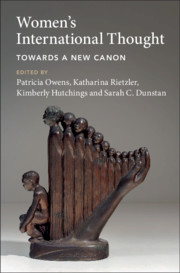Book contents
- Women’s International Thought: Towards a New Canon
- Women’s International Thought: Towards a New Canon
- Copyright page
- Contents
- Preface and Acknowledgments
- Introduction
- 1 Field and Discipline
- From “A Course in International Relations” (co-authored with Nicholas Kelley) (1915)
- From “Proposal for a Foundation for Instruction in International Affairs” and “Foundation for Instruction in International Affairs”
- From The Growth of International Thought (1929)
- From “International Relations as an Independent Subject” (1934)
- From “Teaching of International Relations in Negro Colleges” (1947)
- From “Idealism and Realism in International Relations,” an Inaugural Lecture (1949)
- From “The Teaching of International Relations in the United States” (co-authored with William T. R. Fox) (1961)
- From “The Nature of Contemporary History” (1966)
- Jessie W. Hughan
- Committee on the Bureau of International Research in Harvard University and Radcliffe College (n.d. c. 1923)
- F. Melian Stawell
- Lucy Philip Mair
- Merze Tate
- Agnes Headlam-Morley
- Annette Baker Fox
- Rachel Wall
- 2 Geopolitics and War
- 3 Imperialism
- 4 Anticolonialism
- 5 International Law and International Organization
- 6 Diplomacy and Foreign Policy
- 7 World Peace
- 8 World Economy
- 9 Men, Women, and Gender
- 10 Public Opinion and Education
- 11 Population, Nation, Immigration
- 12 Technology, Progress, and Environment
- 13 Religion and Ethics
- Index
Merze Tate
from 1 - Field and Discipline
Published online by Cambridge University Press: 12 April 2022
- Women’s International Thought: Towards a New Canon
- Women’s International Thought: Towards a New Canon
- Copyright page
- Contents
- Preface and Acknowledgments
- Introduction
- 1 Field and Discipline
- From “A Course in International Relations” (co-authored with Nicholas Kelley) (1915)
- From “Proposal for a Foundation for Instruction in International Affairs” and “Foundation for Instruction in International Affairs”
- From The Growth of International Thought (1929)
- From “International Relations as an Independent Subject” (1934)
- From “Teaching of International Relations in Negro Colleges” (1947)
- From “Idealism and Realism in International Relations,” an Inaugural Lecture (1949)
- From “The Teaching of International Relations in the United States” (co-authored with William T. R. Fox) (1961)
- From “The Nature of Contemporary History” (1966)
- Jessie W. Hughan
- Committee on the Bureau of International Research in Harvard University and Radcliffe College (n.d. c. 1923)
- F. Melian Stawell
- Lucy Philip Mair
- Merze Tate
- Agnes Headlam-Morley
- Annette Baker Fox
- Rachel Wall
- 2 Geopolitics and War
- 3 Imperialism
- 4 Anticolonialism
- 5 International Law and International Organization
- 6 Diplomacy and Foreign Policy
- 7 World Peace
- 8 World Economy
- 9 Men, Women, and Gender
- 10 Public Opinion and Education
- 11 Population, Nation, Immigration
- 12 Technology, Progress, and Environment
- 13 Religion and Ethics
- Index
Summary
I was invited to discuss with you the teaching of International Relations in Negro Colleges. I have changed my subject to the Teaching of International Relations. There is no justification for teaching International Relations in any different way in a Negro College from the way it should be taught in a white college. In teaching at Howard University I present the same material in the same manner as I would at Michigan, Radcliffe, Smith, Wellesley, Indiana State, or Ohio State. The only departure that I feel is justified is the constant reminder that the American Negro is only one of many minorities in the world and that his problem is not unique but only one phase of a much larger issue. The teacher of international relations at the College level has an opportunity to draw on several fields of learning for there are many facets to power politics. These may be economic, political, historical, cultural, geographic, ideological, etc. Consequently, all the social sciences provide basic material. If the particular course in international relations at Howard University happens to be History 202A – European Diplomatic Relations 1870–1941 or 202B – Problems of Modern Europe 1914–1941 we will find economics, geography, political science, political philosophy, international law and geo-politics inextricably interwoven with the history of these periods. One cannot teach 19th and 20th century imperialism, the partitioning of Africa, of Asia, of the Pacific, of the Arctic and Antarctic regions, and the scramble for world markets and spheres of economic penetration without a background of geography. An examination of 19th and 20th century laissez-faire liberalism, leads inevitably to a consideration of the last phases of capitalism and a study of scientific socialism or Marxism; while a history of 20th century Russia and the U.S.S.R. compels one to examine Lenin’s great contribution to socialism in deciphering the “dictatorship of the proletariat” through the device of the soviet.
- Type
- Chapter
- Information
- Women's International Thought: Towards a New Canon , pp. 49 - 54Publisher: Cambridge University PressPrint publication year: 2022



